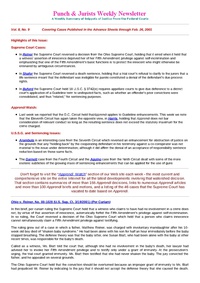This case is noted as a graphic example of what has become a fairly common double whammy at sentencing: a five level swing consisting of a two level sentence enhancement for obstruction of justice and a denial of the three level enhancement for acceptance of responsibility. The case is …
Here the Court affirmed the denial of an acceptance of responsibility sentence reduction, even though it also held that it was improper to impose an enhancement for obstruction of justice based on the same conduct.
This case is noted as a graphic example of what has become a …
In this case the defendant-Appellant Betty Louise Marek pleaded guilty to paying an undercover FBI agent, who was posing as a hit-man, to murder her boyfriend's paramour. Marek was arrested after she used Western Union to transfer $ 500 to the putative hit-man. Marek initiated the wire transfer in …
In this brief, per curiam ruling the Supreme Court held that a witness who claims to have had no involvement in a crime does not, by virtue of that assertion of innocence, automatically forfeit the Fifth Amendment’s privilege against self-incrimination. In so ruling, the Court reversed a decision of …
The defendant in this case pled guilty to several drug trafficking crimes. After his conviction was affirmed on appeal, defendant moved for habeas relief under 28 U.S.C.S. § 2255. The United States District Court for the Eastern District of Oklahoma denied his petition and defendant appealed. The defendant alleged …
In Chapter One of the Guidelines Manual, the Sentencing Commission readily acknowledged that “[a] sentencing system tailored to fit every conceivable wrinkle of each case would quickly become unworkable and seriously compromise the certainty of punishment and its deterrent effect.” U.S.S.G., Ch. 1, Pt. A, § 3. Having said …
It took a long time for the D.C. Circuit to address Apprendi v. New Jersey, 530 U.S. 466 (2000), but its analysis of that decision was worth the wait. Here, not only did the Court agree that, in drug cases, the Government “must state the type and quantity in …
Here the Court held 18 U.S.C. § 3742(e) requires appellate courts to give due deference to a district court's application of a Guideline term to undisputed facts, such as whether an offender’s prior convictions were related for sentencing purposes.
In his opening sentence, Justice Breyer acknowledged that the …
Here the Court reversed a death sentence, holding that a trial court’s refusal to clarify to the jurors that a life sentence meant that the defendant was ineligible for parole constituted a denial of the defendant’s due process rights.
Back in 1994 the Supreme Court struck down a …
Recently the D.C. Circuit Court held, in U.S. v. Fields, 242 F.3d 393 (D.C. Cir. 2001) (See P&J, 2/19/01), that a “leadership” sentencing enhancement under U.S.S.G. § 3B1.1(a) is subject to the Apprendi rule because the fact of a leadership role may increase a defendant’s sentence beyond the prescribed …
Here the Court held that where a defendant is convicted of a § 924(c) violation, his sentence may not be enhanced at all for any conduct for which the defendant is accountable within the scope of relevant conduct under U.S.S.G. § 1B1.3.
This is another case that deals …
The defendant in this case, Gerold Oliver, on leave from the Post Office, sought and received total disability benefits while also working as a registered nurse. The Government filed a complaint charging him with false application for benefits, in violation of 18 U.S.C. §§ 1920-1922 and 18 U.S.C. §§ …
